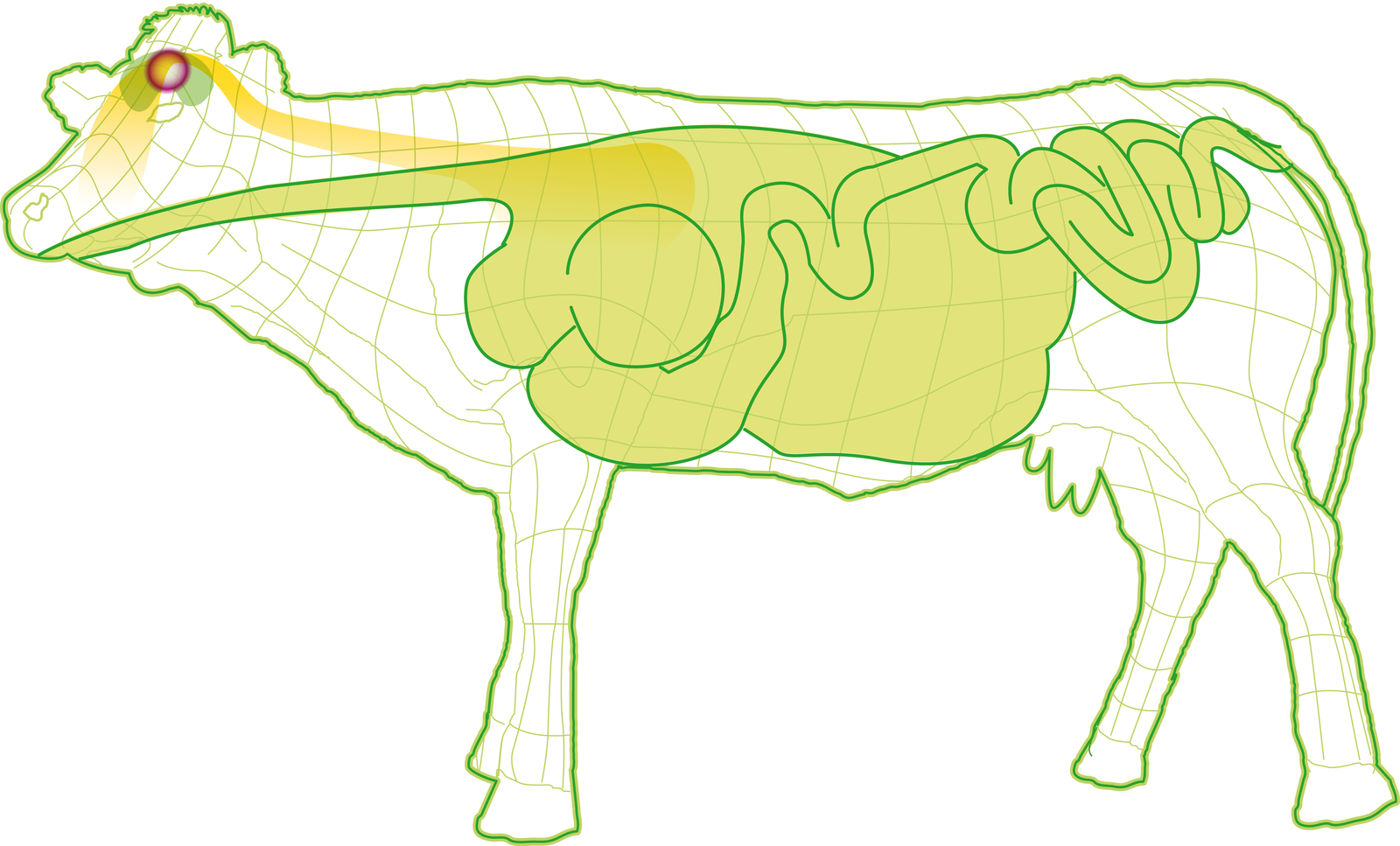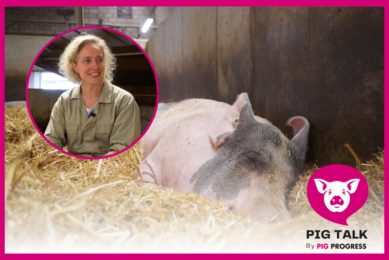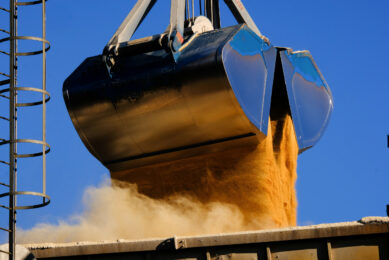Stress management to improve animal performance

Stress is a multi-factorial and growing concern in animal ?production, which influences both short- and long-term ?performances. However, the real impact of stress on animal ?production is certainly overlooked. It appears that natural ?nutritional solutions aimed at creating a positive olfactory ?experience can help reduce stress in animal farming. As a ?result, performance and reproduction can be enhanced.
By Virginie Noirot, Laboratoires Phodé
Stress has a proven impact on animal performance: it can reduce milk and meat production, alter reproduction and the animals natural defences. However, genetics has increased productivity in animals to the detriment of their natural resistance to stress, while modern breeding practices have multiplied the sources of stress for livestock, such as transportation, early mother-young separation, high population density, confinement, and dietary changes. Among the various complementary solutions to control stress levels in livestock, an original approach that has been the conviction of Laboratoires Phodé for 15 years is the impact of olfaction on animal well-being and thus on performances. Several studies have confirmed that specific aromatic complexes are able to reduce stress response in animals and regulate feed intake, with a positive impact on short and long–term performances.
The impact of stress on animal
performance
Stress affects productivity in farm animals, reducing the production of muscle, milk or eggs. Several mechanisms are implicated:
– Change in metabolic priorities: stress mobilises body reserves to the detriment of production (muscle, milk, or eggs). Adrenaline stimulates gluconeogenesis and lipolysis, and a chronic increase in circulating glucocorticoids leads to protein catabolism. - Feed intake reduction: stress reduces appetite and feed intake through hormonal pathways. For example, it has been shown for pigs that each 0.1 m² reduction in space is associated with a reduction in voluntary intake of 50 g/day. - Hormonal responses: for example, the production of prolactin, the hormone of milk secretion, is inhibited by stress in the pig, rat and human. In dairy cows, acute stress inhibits the release of oxytocin, the hormone of milk ejection. A link has also been established between stress and reproduction. Stress has a negative impact on the secretion of sexual hormones. In addition, stress can impair the maturation of gametes, cause abortions, premature births or new born of low birth weight. Stress during pregnancy may also alter maternal behaviour. – As in humans, stress can badly alter animal health, in particular by affecting their natural defences. For example, in pigs, the innate or immune response is inhibited by stress. This has been shown with vaccination: changing the composition of a group of pigs three days after antiviral vaccination decreases the effectiveness of vaccination, inhibiting the development of a specific immune response.
Stress can also affect animal production “beyond the farm”, with consequences for the consumer on animal product quality and safety. A review highlighted a link between stress in farms animals and increased risks of carriage and shedding of foodborne pathogens such as E. coli O157:H7, Salmonella, and Campylobacter, which represent major public health and economic concerns for the industry. The authors suggested several possible ways stress on the farm can translate into increased food safety risk:
- By affecting the health of the
animal’s gastrointestinal tract via brain-gut communication. - By causing pH in an animal’s stomach to increase, which in turn increases the probability that foodborne pathogens can survive gastric passage and colonise the gastrointestinal tract.
- By increasing animal susceptibility to new and more severe infections.
Finally, the stress around slaughter (transportation, handling etc.) has a known impact on the organoleptic and preservation qualities of meat for the consumer (tenderness, aspect, etc.). Modern facilities are integrating this parameter in their animal handling processes, designed to limit acute stress for the animals around slaughter.
Stress management through olfaction
Stress in farm animals has multiple consequences, which, finally impacts the farmers revenue. Stress should thus be taken into consideration from both animal welfare and productivity points of view. In addition to practical animal housing and handling practices, some natural nutritional solutions have been designed to limit the impact of stress and enhance animal performances. These solutions are based on the re-discovery of a primary sense that we seem to have lost in the evolution race: olfaction. The olfactory experience is intimately linked to feed intake (palatability, loyalty to feed), and overall well-being. Behavioural studies have shown that certain olfactory compounds can have a positive effect on stress and mood of animals: D-limonene, or essential oils (EO) that contain it, have shown an anxiolytic effect on rodents. Linalool from lavender EO has also shown anxiolytic properties in mice. In humans, the smell of lavender or milk decreases blood cortisol of infants submitted to stress from heel blood drawing. Inhaled citrus EO can decrease the need for antidepressant treatments by hospitalised patients treated for severe depression. An inhaled orange EO has shown an anti-stress effect on humans in the case of behavioural measures in a dentist office by patients waiting for dental treatment. To explain the effect of aromatic compounds on stress, several modes of action are possible, not excluding each other: – Olfactive perception can be associated to cerebral pleasure. – Active ingredients can have an effect on the nervous transmission of stress at brain level, probably by the modulation of neurotransmitters via endo-cannabinoid system. – At last, anti-inflammatory properties of some ingredients can have consequences on stress management. With the aim to limit the impact of stress on animals, researchers at Laboratoires Phodé have applied their olfaction expertise to develop a complex of specific aromatic molecules of natural origin (VéO). As a result, overall well-being is restored and feed intake is more regular, resulting in better performance.
Enhanced performances
Animal trials confirm the benefits of the natural aromatic complex on feed intake and productivity of farmed animals. In dairy cows, recent trials were performed in Colombia. For example, in grazing cows who received the supplement via the concentrate, VéO lead to an overall higher milk yield, going up to 3 kg more milk produced daily at milk peak (Figure 2). The amount of concentrate consumed per kg of milk produced was reduced with the supplement (from 0.25 to 0.23 kg/litre), showing a higher return on investment for the producer.
In lactating sows, a trial carried out under a hot climate showed a significant effect of the supplement on feed intake (+10%; P<0.05), which was reflected on piglet performance at weaning (litters were 4% heavier; P<0.05).
In sows, it was reported that the
supplement reduced the weight loss during lactation, independent of their lactation number (Figure 3 – see attached pdf). It has been hypothesised that the specific aromatic molecules act on the nervous message, inducing a reduction in the stress message and regulating the sows’ appetite.
Improved reproduction in dairy cows
The complex repeatedly shows improved reproduction performances in dairy cows.
A meta-analysis was conducted on
18 farms (4,569 dairy cows involved altogether) to measure the effect of the complex on fertility and fecundity. In each farm, two groups of cows were observed, both receiving the same basal diet, with (VéO) or without
(control) the natural aromatic complex. The observations were conducted over 14 months on average.
Both fertility, defined as the ability to reproduce, i.e. to come again in heat for insemination and fecundation, and fecundity (the capacity to go to the end of gestation in required delays) were assessed with various parameters (). It was concluded that the natural aromatic complex improves reproduction performances of dairy cows by positively acting on the main criterions of both fertility and fecundity: interval between calving and return to estrus, number of artificial insemination (AI) to have a fecundation, and the rate of cows needing more than 3 AI to be pregnant were significantly decreased, while the pregnancy rate was increased. Fecundity is improved with a remarkable reduction of intercalving, calving to first AI, and calving to conception intervals. These results can be explained by the anti-stress properties of the complex: the reduction of the release of stress hormones allows decreasing troubles in cyclicity and reproduction hormones. If the link between stress and reproduction troubles is widely accepted, its management is not part of current herd practices. The attenuation of stress nervous message by a positive olfactory experience appears as a natural and effective solution to optimise reproduction in dairy cows, and possibly also in other animal species.
References are available on request.











